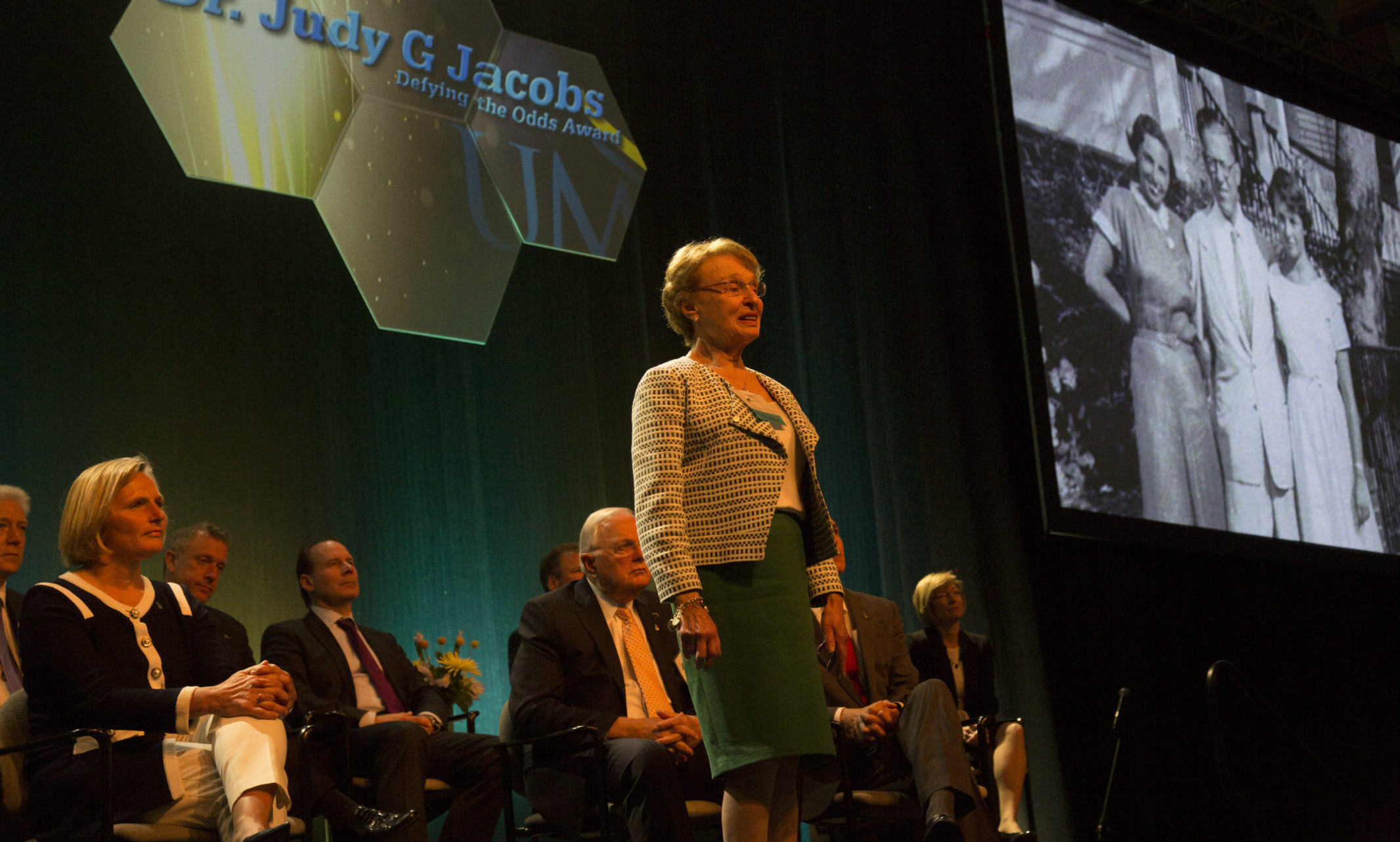Alumna Judy Jacobs' portrait by Luigi Toscano is featured in "Lest We Forget," a Holocaust memorial exhibit at the World War I Museum and Memorial courtyard through Oct. 6.
Judy Jacobs (MBA '77, Ph.D. '86) was the 2016 University of Missouri-Kansas City Defying the Odds Alumni Award recipient. She previously shared her powerful story with us. Here's our discussion about her childhood in Hungary and time in the Bergen-Belsen camp.

What was your childhood like before that horrible day in 1944?
My early childhood in Budapest was idyllic. We were an upper middle-class family, with a lovely home and an enviable lifestyle. I am an only child and my parents gave me all the attention I craved. I was also the only grandchild on my mother’s side. I had many aunts, uncles and cousins in Budapest. The relatives, coupled with a large number of friends, provided a happy environment. Although my father was a busy radiologist, he always had time for me. In the winters we ice skated together every day. My mother was credentialed in art and design. She and I spent many hours on craft projects and making doll clothes. I spent much of every summer with my maternal grandparents in Bekes, a small town in southeast Hungary, allowing me to enjoy the outdoor activities unavailable to a city dweller.
There was more than one “horrible day.” The quality of our lives steadily deteriorated as anti-Semitism became institutionalized, beginning about the time Hungary joined the Axis in 1943. From then on, we increasingly felt the general effects of the War and were subjected to an ever growing list of restrictions because we were Jewish.
The Nazis occupied Hungary on March 19, 1944, marking the beginning of the end for Hungarian Jewry. From then on our lives were defined by fear, deprivation and uncertainty. Our time outdoors was limited to a few hours in the afternoon. The Nazis often sealed off both ends of a given block and arrested all Jews there, who were easily identified by the yellow stars on their outer garments. Some were jailed, some were immediately deported to a concentration camp and others were marched to the Danube where they were shot into the river. We were barred from using any type of transportation and our mail and newspapers were censored. We never knew what would happen next. As a young child, I was always frightened.
How do you describe life in Bergen-Belsen when sharing your story?
Life in Bergen-Belsen was hell! The Nazis referred to us as subhuman, and treated us accordingly. We suffered no direct physical abuse, but the psychological degradation to which we were subjected is indescribable. During daily roll call, the Nazis brandished their whips and menacingly pointed their guns at us; they repeatedly called us vermin unworthy of living, filthy pigs and parasites. As a seven-year-old child I began to wonder if I really was a subhuman, filthy, Jewish pig.
Our daily rations of about 350 calories were barely edible. There were bunks in our filthy and unventilated barrack; three abreast and three high. They were covered with dirty straw. Vermin of all kinds including mice, rats, bedbugs and fleas became our constant bedfellows. There was no hot water or soap. Such unsanitary living conditions and substandard diet caused extensive disease, but the Nazis provided neither medical care nor drugs or supplies.
"I was seven years old in the concentration camp. I lived in constant fear, fear of Nazi terror, fear of being separated from my parents and fear of the unknown."
Many hopeless inmates spent most of the day on their bunks, with eyes glazed. My parents recognized the importance of maintaining their humanity. My father and some of his colleagues organized “clinics” for the sick. They had neither equipment nor supplies but they were able to provide a modicum of care, mostly in an advisory capacity. By helping fellow inmates, they were able to regain some dignity and, thus, their humanity. My mother, despondent as the rest, recognized the importance of morale and she taught drawing to some interested children. With no available art supplies, she used a stick and the dirt at her feet instead of drawing paper and pencils.
I was seven years old in the concentration camp. I lived in constant fear, fear of Nazi terror, fear of being separated from my parents and fear of the unknown. I had nothing to do most of the time and just followed my parents around, intently listening to their conversations and always keeping my eyes cast downward, hoping not to be noticed. According to my birth certificate I was a seven-year-old child. In reality I was seven years old, but I had no opportunity to be a child.
How were you liberated from Bergen-Belsen?
We had come to Bergen-Belsen on the Kasztner Train, a rescue operation named after the man who organized it. Kasztner reached a deal with the Nazis whereby they agreed to transport a trainful of Jews (ultimately 1,686) to the safety of a neutral country for about $1,000 per person. They received a portion of the money in advance; the balance was payable when the train reached its destination. Instead of a neutral country, the train went to Bergen-Belsen. Desperate for money near the end of the War, the Nazis released us to Switzerland and received the balance due at the Swiss border.
In June, we had gone to Bergen-Belsen in overcrowded, filthy cattle cars. Six months later, we left the train station in a heated passenger train, not knowing where we were headed. The Nazis provided edible food. I remember sardines and chocolate. We realize we had been freed as we heard the church bells of St. Gallen, Switzerland.

